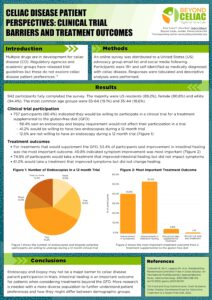A drug that would help heal the intestine is important to patients, according to survey results presented by Beyond Celiac at International Celiac Disease Symposium

By Amy Ratner, director of scientific affairs
For those with celiac disease, an endoscopy and biopsy may not be a major barrier to participating in clinical trials, a study presented by Beyond Celiac at the International Celiac Disease Symposium (ICDS) found.
Additionally, intestinal healing is an important result when celiac disease patients consider potential treatments in addition to the gluten-free diet, according to the study, which was based on an online Beyond Celiac survey.
Although regulatory agencies and academic groups have released clinical trial guidelines for the multiple celiac disease drugs being investigated, patient perspectives have not been explored. The survey asked people with celiac disease what they would be willing and unwilling to do in clinical trials for new celiac disease drugs. It also asked what they want a drug to do for them in terms of healing the intestine and relieving symptoms.
Nearly 950 adults fully completed the survey, which was distributed to a Beyond Celiac email list and followers on social media. Most were US residents, female and white.
Survey results were presented at ICDS as a poster by Deb Silberg, MD, Beyond Celiac chief scientific officer.

About 80 percent of those surveyed said they would be willing to participate in a clinical trial for a drug to be taken in addition to the gluten-free diet. Of those, about 58 percent said a required endoscopy and biopsy would not affect their participation. About 41 percent said they would be willing to have two endoscopies, but about 12 percent said they were not willing to have any endoscopy as part of a trial.
During an endoscopy, a very thin, flexible tube is snaked from the mouth to the small intestine, and a small tool is used to take tissue samples, called biopsies, from the wall of the intestine. Patients are sedated, with the type and amount of sedation dependent on age and any other co-existing medical conditions.
About 53 percent of those surveyed said improvement in intestinal healing was the most important outcome of a treatment in addition to the gluten-free diet. About 41 percent said improvement of symptoms was most important.
Nearly 75 percent of those surveyed said they would take a drug that improved intestinal healing but did not improve symptoms. Alternatively, 61 percent said they would take a drug that improved symptoms but not healing.
The celiac disease symposium, organized by the International Society for the Study of Celiac Disease, is held every two years. It is designed to bring together scientists from around the world to share the latest findings from their work in celiac disease. Beyond Celiac presented talks and posters at several previous symposiums.
Opt-in to stay up-to-date on the latest news.
Yes, I want to advance research No, I'd prefer not to